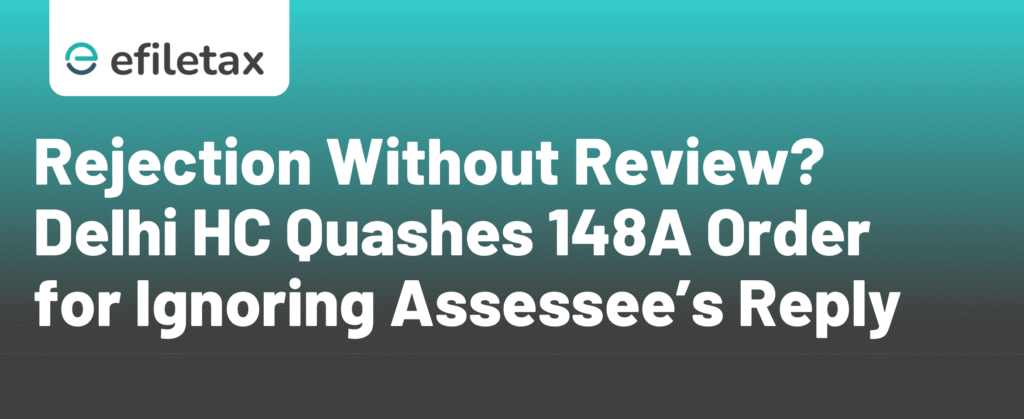
Delhi HC Section 148A Invalid If Assessee’s Reply Is Ignored
In a major relief to taxpayers, the Delhi High Court recently ruled that reassessment proceedings under Section 148A of the Income Tax Act, 1961 are invalid if the taxpayer’s reply is disregarded, especially when the information is already available on the Income Tax Portal.
Let’s break down what the Court said, and why it matters to every Indian taxpayer receiving a notice under Section 148A.
Background: What is Section 148A?
Section 148A was introduced by the Finance Act, 2021 to protect taxpayers from arbitrary reassessment.
Under this section, before issuing a notice under Section 148, the Assessing Officer (AO) must:
- Issue a show-cause notice with reasons
- Give the assessee a fair opportunity to respond
- Consider the reply objectively before taking further steps
⚖️ This ensures natural justice and transparency in reopening assessments.
The Delhi High Court Case: What Happened?
Case Title: Bharat Aluminium Company Ltd. vs. Union of India & Ors
Citation: [W.P.(C) 12701/2023, Decided on 30th May 2024]
Court: Delhi High Court
Bench: Justice Rajiv Shakdher and Justice Girish Kathpalia
Key Facts:
- The taxpayer received a notice under Section 148A(b) based on some third-party information.
- The assessee submitted a detailed reply with documentary evidence and PAN-wise data already available on the income tax portal.
- The AO passed an order under Section 148A(d) ignoring the response and initiated reassessment under Section 148.
Court’s Observations: Why Section 148A Is Invalid Here
The Delhi HC quashed the reassessment order. Here’s why:
| Issue | Court’s View |
|---|---|
| No application of mind | AO passed a mechanical order without addressing the assessee’s reply |
| Violation of natural justice | Ignoring a detailed response defeats the purpose of Section 148A |
| Information already on portal | The very data used for reassessment was already declared by assessee earlier |
| Reopening based on assumptions | Mere “borrowed satisfaction” from third-party info is insufficient |
Key Quote:
“The process adopted by the AO reflects a perfunctory approach… proceedings initiated under Section 148A stand vitiated.”
Expert Tip: Always Submit Detailed Replies to Section 148A Notices
Even if you believe the data is already on the portal, file a response with clarity and evidence.
But if the AO ignores your reply, you have strong legal grounds to challenge it — just like in this case.
Practical Tip by CA Raghav Jain:
“Keep a digital record of your replies, acknowledgement from the portal, and all supporting docs. If the AO fails to discuss these in the 148A(d) order, it’s a red flag.”
Legal Takeaway for Taxpayers
This ruling reinforces that Section 148A is not a formality — it must be meaningfully followed.
Ignoring an assessee’s response = invalid reassessment.
Action Steps for Assessees:
- Respond within the prescribed time (usually 7 days)
- Include all relevant facts, PAN data, IT portal records
- If the AO still issues a Section 148 notice without reasons, consult a tax professional to file a writ petition
Efiletax Can Help
Received a Section 148A notice?
Let our experts draft your response and help you stay compliant — without stress.
Contact Us Now to protect your rights under the law.
Summary
Delhi HC held Section 148A invalid if AO ignores taxpayer’s reply. Reassessment must consider assessee’s data, especially when available on the income tax portal.
FAQs
Q1. What is Section 148A of the Income Tax Act?
It’s a safeguard requiring tax officers to give taxpayers a chance to explain before reopening old assessments under Section 148.
Q2. What happens if the AO ignores my reply?
As per Delhi HC, such action is invalid. You can challenge the order in High Court.
Q3. Is portal information enough to avoid reassessment?
No. You must still reply to notices — but can use portal records to support your case.